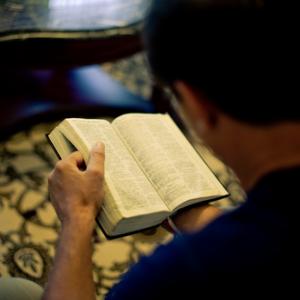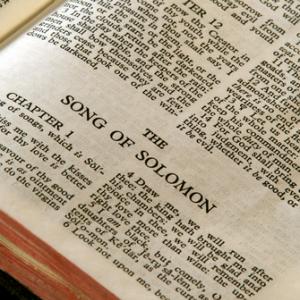
Martin L. Smith, an Episcopal priest, is an author, preacher, and retreat leader. He lives in Washington, D.C.
Posts By This Author
The Season to Put on Beauty
Reflections on the Common Lectionary, Cycle C
“TAKE OFF THE garment of your sorrow and affliction, O Jerusalem, and put on forever the beauty of the glory from God. Put on the robe of the righteousness that comes from God; put on your head the diadem of the glory of the Everlasting” (Baruch 5:1-2). We might occasionally hear in church a prayer that makes passing use of the phrase “the beauty of holiness,” but it can’t be claimed that we are helped very often to feel that the contagious goodness of God is absolutely lovely, alluring, and attractive. We are called to be beautiful human beings. Christians who are deeply serious about social justice, who carry the burden of the world’s brokenness in their hearts, who are committed to political dissent, probably need this reminder most of all. We can hardly be agents of change if our faces are disfigured by disgust and anger.
Advent may be an especially important time to listen carefully for the Word who summons us to be walking sacraments of God’s radiant beauty. Paul will speak to us about having joy in one another and clothing ourselves in love. We are meant to fill our imaginations in these weeks with the sight of Mary in the radiance of her final days of pregnancy. Doesn’t her beauty lend all the more power to her proclamation, “[God my savior] has brought down the powerful from their thrones, and lifted up the lowly; has filled the hungry with good things, and the rich sent away empty” (Luke 1:52-53)?
A World Without Immigrants?
Reflections on the Common Lectionary, Cycle B
IT WOULD BE strange if any segment of the liturgical year left out the theme of migration. The Bible is riddled from end to end with the journeys of nomads, pilgrims, exiles, returning exiles, and the risky intrusions of strangers across boundaries erected to deter them.
This season’s poster child for divinely inspired mobility is the lovely figure of the Moabite “alien” Ruth, who chooses to leave her own country and accompany her beloved Jewish mother-in-law when she returns as a widow to her native Judea. Ruth’s story is romantic, even erotic, as she daringly slips into the arms of Boaz during the sexually charged siesta at the threshing floor. But our readings are no mere novelette. Scripture shows how much hinged on her pluck and her allure. Her great-grandson will be David, and her descendant Jesus the Messiah!
“Where would we be without immigrants?” is one of the many questions between the lines of the scriptures. The Bible has lots to say to us about the divine impulse active in migrations, and the opening of the heart to “strangers within our gates”—things guaranteed to alarm defensive nationalists of every stripe.
I remember the deep spiritual emotion that caught us all up in Boston’s Faneuil Hall during my naturalization ceremony—Cambodian refugees, Vietnamese grandmothers, Salvadoran families, and all the rest of us. I think of the migration of my own great-grandparents to Russia, and the adventures that have scattered my own family from New Zealand to Mexico. How God revels in mixing us all up!
When the Bible Reads You (October 2012)
Reflections on the Common Lectionary, Cycle B
OUR READINGS FROM Hebrews yield one of the most intense images for the experience of being addressed by the Holy One: “Indeed the word of God is living and active, sharper than any two-edged sword, piercing until it divides soul from spirit, joints from marrow: It is able to judge the thoughts and intentions of the heart. And before God no creature is hidden, but all are naked and laid bare to the eyes of the one to whom we must render an account” (12: 4-16). Those who passionately feel convicted by the Word to work for the transformation of the broken and unjust structures of society need to witness to our own continuous religious experience of being penetrated, judged, and aroused in our living conversation through scripture. Otherwise people might mistakenly imagine that this strong language somehow belongs to those who extol the inerrant authority of scripture while finding in it support for reactionary values.
A prison chaplain gave a new inmate a Bible. Asked later what he made of it, the prisoner replied simply, “I didn’t read the book; it read me.” And this isn’t an occult experience. We allow ourselves to be addressed whenever we drop those filters that screen out impressions that threaten upheaval for the status quo. A critic once said of Austrian artist Oscar Kokoschka’s drawings, “We don’t look at them, they look at us, searching, probing, and testing us,” and these words come back to me often when I open the Bible for meditation, and drop my defenses.
Romancing the Word (September 2012)
Reflections on the Common Lectionary, Cycle B
Reflections on the Common Lectionary, Cycle B
Bread From Heaven
Reflections on the Common Lectionary, Cycle B
THE MOTTO OF RADICAL FAITH always is “now—or never.” If we can’t find divine grace reaching out to us in the here and now, just where we are, then we will never find it. We won’t find it by merely dwelling on the stories and legends of divine interventions in the past. For centuries, the fourth gospel has made people uneasy because it heightens the tension between those who think of religion as loyalty to what has been handed down for us to repeat and those who are prepared to see God right before them and with them now. This month we are asked to immerse ourselves in the very tense sixth chapter of John’s gospel, in which Jesus provokes bafflement and resentment by daring to appropriate to himself the mystique of the manna, the bread from heaven given by God to sustain the Israelites on their journey through the wilderness.
Everyone knew what the bread from heaven was. It was something miraculous embedded in legends of yesteryear, wasn’t it? Quite apart from being scandalized by Jesus’ apparent delusional egomania, the people are unsettled by the way he wrests the whole theme of being fed by God from its safe mummification in legend and miracle, and plants it in the immediate here and now. He forces the question about whether we dare acknowledge our own pangs of hunger for the eternal, and whether we are prepared to receive—eat and drink—the living person of Christ as the gift that will satisfy that hunger.
Dynamics of Ordinary Time
Reflections on the Common Lectionary, Cycle B
Listening to the scriptures requires a gentle determination to remove the filters that tend, in our religious culture, to allow in only what serves individual solace or personal edification. The scriptures probe the realities of power, how it is cornered, monopolized, deployed, lost, and regained at every level—in societies, in institutions, in families—as well as in the dynamics of our own lives. Even the best Bible study groups and sermons often surrender to the bias exerted unconsciously by our own individual neediness. Perhaps a conscious policy is needed to heed the word of God as it dissects the social body, lays bare its anatomy, and reveals its diseases. This approach may have a greater impact on our personal lives than conventional piety.
Far from reducing the spirituality of our engagement with scripture, learning its hermeneutic of power is likely to intensify our appreciation of its relevance to our own immediate issues and needs. As persons, we internalize and encapsulate the forces at work on a larger scale in a struggling world. God is wholly present as redemptive, suffering, hope-engendering love at every level of existence—from the inner dynamics of the soul to couples, families, neighborhoods, nations, the planet, and the entire universe. One of the most ancient religious instincts of humanity gave rise to the concept of the human person as a microcosm, a world in miniature. Scripture’s word is addressed to us in our unique personhood, and to the churches, communities, and nations in which we are embedded.
God's Passionate Vulnerability
Reflections on the Common Lectionary, Cycle B
One of the drawbacks intrinsic to liturgical worship is the length of time it takes to adopt expressions that are newly current and potent into the approved forms. Certain forms of language become deeply important to a generation—key words and symbols that are pregnant with meaning, yet haven’t been incorporated officially into our forms of worship. So we often feel a certain dissonance in church as the language of worship seems impoverished by the absence of expressions we value so highly in our own exploration into God today. I long for prayers that express, directly and passionately, that God suffers. I look forward to praising God’s vulnerability. I am impatient for the recasting of prayer to praise the Creator in terms that unequivocally embrace the evolutionary perspective. In the meantime, preaching is the key field for using this fresh language with passion, in an exciting conversation with ancient expressions and classic symbols that can never become out of date, as long as we use our imaginations to keep on releasing their latent powers.
The scriptures in this season provide rich opportunities for exploring great images of God’s transforming power in vulnerability. Has anyone coined the word “paradoxology” yet to express the essence of transformative Christian worship? Only paradoxical language can point with any degree of success to the mystery of God and the revelatory revolution that springs into life out of the action of Jesus, the passion of Jesus, and the resurrection of Jesus.
New Wind, New Flesh
Reflections on the Common Lectionary, Cycle B
Experiments in my first science class at school left an indelible impression on my imagination. I was particularly fascinated when the physics teacher covered a hefty bar magnet with a sheet of paper and then sprinkled iron filings over it. We made the filings jump about by banging the table and when they fell back they aligned themselves into a graceful fern-like pattern, revealing the invisible lines of force emanating from the magnet below. That’s why I love this sentence from the Easter sermon in John Updike’s novel A Month of Sundays: “Still to this day ... the rumor lives, that something mitigating has occurred, as if just yesterday, to align, like a magnet passing underneath a paper heaped with filings, the shards of our confusion, our covetousness, our trespasses on the confusions of others, our sleepless terror and walking corruption.”
Again in Eastertide we sense that the resurrection of Jesus has started to pull the scattered impulses of our lives into a new pattern. We realize afresh that Christian life is essentially powered by hope, a passion for the unprecedented, possibilities for life in our world that have never been seen before. We recall that Christian life is not a religious ideology to be propagated, but an actual incorporation into the person of the risen Christ and an intimate experience of divine indwelling, through the Spirit active and present in the heart and in our relationships.
The Foolishness and Weakness of God
Reflections on the Common Lectionary, Cycle B



